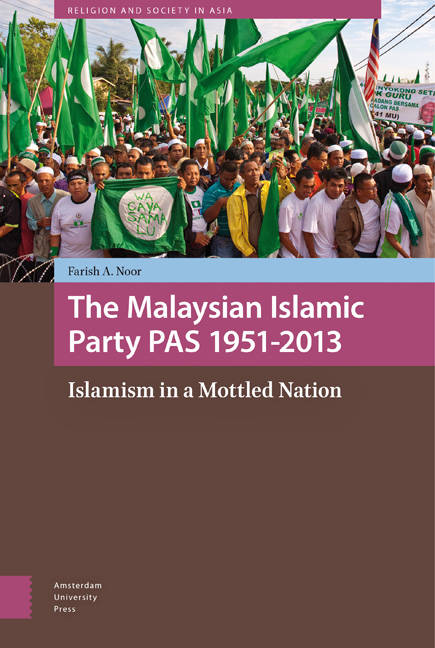Book contents
- Frontmatter
- Dedication
- Contents
- Introduction: Islamism in a Mottled Nation: The Story of PAS
- 1 1951-1969: The Orphan of the Cold War: An Islamic Party Steps on the Stage of Malaysian Politics
- 2 From Internationalism to Communitarianism: PAS as the Defender of Malay Rights: 1970-1982
- 3 PAS in the Global Islamist Wave: 1982-1999
- 4 The Jihad of the Ballot Box: PAS’s Democratic Experiment: 2000-2013
- 5 Religion, Politics, Islam, Islamism: What PAS Is, and What It Is Not
- Bibliography
- Index
4 - The Jihad of the Ballot Box: PAS’s Democratic Experiment: 2000-2013
Published online by Cambridge University Press: 12 February 2021
- Frontmatter
- Dedication
- Contents
- Introduction: Islamism in a Mottled Nation: The Story of PAS
- 1 1951-1969: The Orphan of the Cold War: An Islamic Party Steps on the Stage of Malaysian Politics
- 2 From Internationalism to Communitarianism: PAS as the Defender of Malay Rights: 1970-1982
- 3 PAS in the Global Islamist Wave: 1982-1999
- 4 The Jihad of the Ballot Box: PAS’s Democratic Experiment: 2000-2013
- 5 Religion, Politics, Islam, Islamism: What PAS Is, and What It Is Not
- Bibliography
- Index
Summary
The fact is that all of us face a new historical situation every day. States, organisations, cultures, movements, even civilisations that are most successful are those that can manage, direct, guide, influence, anticipate, manipulate and control the forces of change.
Kalim Siddiqui, Stages of the Islamic Revolution2000-2004: The New Century Explodes
‘Taliban are our Brothers’ Slogan on PAS banner, seen at the PAS demonstration at the American Embassy, Kuala Lumpur, 12 October 2001
As the new century dawned, PAS was in a position to count its winnings and survey the long road it had journeyed thus far. After being on the Malaysian political landscape for half a century, it was now the biggest Malay-Muslim opposition party in the country, with more than a million members, had managed to establish a presence in cyberspace and was in control of two states – Kelantan and Trengganu. For a party that once regarded itself as the ‘orphaned child’ of Malaysian politics, PAS had come into its own and had earned the respect that was being shown to it. PAS was then allied to the Keadilan and DAP parties, but there was no doubting the fact that it was the main opposition party in the country then. Crucially, the party had demonstrated that Islamism was here to stay and that it was set on the course of state capture.
Though PAS had begun to adopt the discourse of democratic engagement, there were still lingering reminders of the older PAS of the 1980s and 1990s in its ranks. The new generation of PAS technocrats and professionals had successfully given the party a new look by the late 1990s, but among the conservative ulama of PAS the old ways seemed best. To give Malaysians a glimpse of what the party had in mind if and when it would come to power at the Federal level, the new chief minister of Trengganu – Ustaz Hadi Awang – played the hudud card that he had tucked up his sleeve all along. Shortly after the elections of 1999, Hadi announced that Trengganu would also have its own hudud ordinances, and that the PAS state government was bent on Islamising Trengganu society in no uncertain terms.
- Type
- Chapter
- Information
- The Malaysian Islamic Party 1951-2013Islamism in a Mottled Nation, pp. 163 - 222Publisher: Amsterdam University PressPrint publication year: 2014



